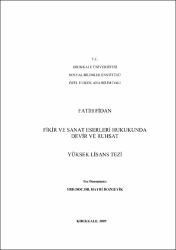Fikir ve Sanat Eserleri Hukukunda devir ve ruhsat
Özet
Eser ve eser üzerindeki hakların varoluşu insanlık tarihi kadar eskidir. Ancak konuya ilişkin hukuki düzenlemelerin ilk olarak 15. yüzyılda başladığını, modern düzenlemelerin de Fransız İhtilali'nden sonra ortaya çıktığını söyleyebiliriz. İlk olarak fikir ve sanat eserlerine ilişkin hukuki düzenlemeler yapılmış, ardından patent, marka ve tasarımlarla ilgili düzenlemelere yer verilmiş, son olarak da bağlantılı haklar hakkında düzenlemeler yapılmıştır.Gerçek anlamda ilk Fikir ve Sanat Eserleri Kanunu, 1910 tarihli ?Hakkı Telif'i Kanunu'dur. Bu kanun'un yerini 1933 yılında Türkiye'de çalışmalarına başlayıp, on yedi yıl İstanbul ve Ankara Üniversitelerinde ticaret hukuku kürsülerinde görev yapan, fikri hukuk derslerini bizatihi veren Prof. Dr. Ernst E. Hirsch'in hazırladığı 5846 sayılı 1 Ocak 1952 tarihli Fikir ve Sanat Eserleri Kanunu almıştır.Tez çalışmamızda eser üzerindeki mali hakların devir ve ruhsat sözleşmelerine konu olması işlenmiştir. Zira, eserden iktisaden yararlanmak, eser üzerindeki mali haklara ilişkin sözleşme ve tasarruflarla mümkün olur. Eser sahibi veya ölümünden sonra mali hakları devralan mirasçılar gerek bu hakların aslını, gerek sadece kullanma yetkisini süre, yer veya muhteva itibariyle sınırlı veya sınırsız, karşılıklı veya karşılıksız olarak başkalarına devir edebilirler.Sözleşme ve tasarrufların konusunu esas itibariyle mali haklar teşkil eder. Manevi haklar kural olarak mali haklardan faydalanma için gerekli durumlarda devir edilebilir. Eser sahibi sırf manevi hakları kullanmak üzere başkasına yetki verebilir; mesela eserin umuma arz edilmesi veya yayımlanma tarzının belirlenmesi başkasına bırakılabilir.Mali hakkı devir sözleşmesi akdedildikten sonra, sözleşmeye konu mali hak eser sahibinin malvarlığından çıkarak, hakkı kazanacak olanın malvarlığına intikal eder. Hakkı devralan, devir işleminde öngörülen şartlar dairesinde ondan tıpkı eser sahibi gibi yararlanır ve başkalarının da yararlanmasını men edebilir.Eser sahibi veya mirasçıları bir mali hakkın sadece kullanma yetkisini de devir edebilirler. Bu takdirde mali hak özü itibariyle onların malvarlığında kalmakla birlikte, maddi bir malın hasılat kirasına verilmesinde veya intifa hakkıyla kayıtlanmasında olduğu gibi, mali hakkı kullanma ve semerelerinden yararlanma yetkisi karşı tarafa intikal etmiş olur. The existence of the work of art and the rights on the work of art is as ancient as the history of humanity. However, the legal regulations relating to this issue started in the 15th century and modern regulations appeared after French Revolution. At first, the legal regulations relating to the work of art and thought, then the regulations relating to patents, trademarks and designs and at last the regulations on related rights were done.First real law about the work of art and thought is ?Copyright Law? in 1910. Then this law was replaced with the law 5846 ? The Work of Art and Thought by Prof. Dr. Ernst E. Hirsch who started his studies in 1933 in Turkey, worked for seventeen years in Istanbul and Ankara Universities at Commercial Law Chair.In our thesis, the financial rights on the work to be the issue of the transfer and the license agrrement have been processed. Admittedly, to get benefit from work economically would be possible with the contract of the work relating to the financial right and savings. The owner of the work or the heirs who take over the rights after the death of the owner can transfer either the essence of the rights themselves or just the authorization to use as limited or unlimited, mutual or unrequited in terms of the duration, place or the content.The issue of the contract and savings mainly constitutes the financial rights. Moral rights can be transferred to benefit from the financial rights in necessary cases as a rule.The owner of the work can entitle his right to someone else to use merely the moral authority, for instance, the submission of the work to the public or the determination of the publication style can be allowed to someone else.After the transfer agreement of the financial right, the financial right relating to the contract on the issue comes out of the owner rights and passes to the one who will get the right by inheritance. The one inheriting the right can benefit from the right just like the owner himself in terms of the prescribed conditions during the transfer and can prohibit the others to get advantage.The owner or the heirs can also transfer just the authorization of a financial right to use, too (License). In that case, while the financial rights essentially remains into their property, upon giving the corporeal hereditament to the ease of a reveneue or as the registration of the usufruct right; the authorization and harvests of the financial right devolve to the other side.
















